
IFSC commentator Matt Groom reports from a new and exciting stop on the World Cup circuit...
This World Cup in Jakarta was potentially a sign of the future of competition climbing. The wall was surrounded by skyscrapers in the middle of a sprawling, heaving and never-stopping city — a mass of traffic, noise and people. It placed climbing front and centre. Imagine a competition on the South Bank of the Thames in London, or in Times Square in New York. It offered a new kind of spectacle. Urban climbing at its finest.
Speed
The final World Cup of the year for Speed and Lead was by far the hottest and sweatiest of the season. The humidity turned everyone into a sweating mess and the athletes tried everything possible to cool themselves off between climbs. Some struggled, others coped, but it was something that all of the athletes, especially the Europeans, had to contend with.
Although Janja Garnbret (SLO) was guaranteed the season title, the men's Lead comp was still wide open, with Luka Potocar (SLO), Jesse Grupper (USA) and Taisei Homma (JPN) having the potential to win the overall. Before the Lead though was the Speed, and as expected in the Speed climbing capital of the world, the crowd was large and vocal.
It was the best speed finals I've ever seen. There were so many races where it looked like one athlete would win, before a slip, or a miss of a timing pad gave the advantage back to the other climber. It was truly edge-of-your-seat stuff.
Aleksandra Kalucka (POL) had already sewn-up the overall title for 2022, but a last medal would be sweet and she managed bronze in the small final. After a better start from Di Niu (CHN), Natalia reeled her in and then a big slip from Di meant an easy finish.
The women's final was between Aleksandra's twin sister Natalia Kalucka (POL) and Deng Lijuan (CHN). Lijuan held on from the start and pulled away at the top, stopping the clock at a bizarre 6.666 seconds for gold.
It was a teammate vs teammate situation for the men, starting with the small final where Jinbao Long (CHN) raced Long Cao (CHN). It was another close race but Cao was more explosive off the start and held on throughout the wall, getting the bronze with Jinbao in 4th.
The Gold medal race was electric. Two Indonesian champions were in front of their home crowd and we were all praying for no false starts. Kiromal Katibin (INA) the world record holder was against Aspar Aspar (INA) who was in brilliant form. Right from the buzzer it was clear that Kiromal was leaving nothing behind. It was the fastest start to a finals that I've ever seen and he was half a body length up on Aspar. A win, and new World Record looked possible. But when you go that fast there is no margin for error and he slipped near the top, slowing him down and allowing Aspar to come through and take victory.
No 5-second barrier was broken this year, but things are developing. Team China use different beta from most, skipping out hold 19 (the penultimate hold) before the top. Clearly this works, and Indonesia in the last month have started to copy them. Already they seem to have this new move dialled in and when they are more used to it, it could mean World Records being broken in 2023.
Lead
On to the Lead next, where the heat and humidity was causing problems. There was an air-conditioned warm-up area for the athletes, and a giant paddling pool filled with ice, but it was still a struggle. Over two days the athletes were whittled down to our final eight. You might have noticed that the Lead wall was similar to the one in Chamonix…and that's because it was the same, the Indonesian federation having bought it for this event and future training. There were therefore still problems with the giant triangle built into the centre of the wall. It limited the route setters as there was a risk for athletes to hit it as they fell. Like in Chamonix, this meant they couldn't use a section of the structure.
British climbers Hamish McArthur (GBR) and Alex Waterhouse (GBR) both made the semi-finals but sadly that's where their competition finished. Congratulations to Alex for his first Lead semi-finals, and a 20th place finish. Molly Thompson Smith (GBR) had been scheduled to compete here, but a nasty injury while on the Grit has left her needing surgery, so I wish her a speedy recovery.
The Indonesian Lead team haven't got the best training facilities and are less well known than their Speed climbing teammates. However, there is lots of passion behind them and we saw some impressive performances from their athletes during semi-finals. The standout was National Champion Raviandi Ramadhan (INA) who seemed to discover superpowers in front of his home crowd. He just kept going, pausing twice to hype the crowd up and won himself a finals place. His first EVER World Cup, and a note to the world to keep an eye on the Indonesian Lead team.
The route setters had planned something unique for the finals. For the first time ever the men and women's routes would combine at the top. The headwall and 15 or so moves would be shared by both sexes. That didn't mean they would be climbing the same route, as the bottom parts were very different to each other. It was a bit of a gamble and put even more pressure on the route-setters, but every athlete I spoke to was excited by the concept.
The crowd once again flooded in and were boisterous in their support. Even the President's wife turned up…or think she did, sadly we weren't introduced! I was surprised at how many autograph hunters and selfie takers there were at the start of the season, but things were next level here. Janja for example was mobbed the moment she stepped into the arena, and I'm impressed at the time she takes talking to people and posing for endless photos. She has lots to deal with, but knows that she is a role model for the sport. Her behaviour effects how people perceive climbing, and she is doing an excellent job at being our ambassador.
Unfortunately none of the men made it onto the headwall, there was a vicious crux before that on the steepest section that sent everyone back to the ground. It was a shame that the route setters' idea wasn't fully realised — a tough thing to pull off.
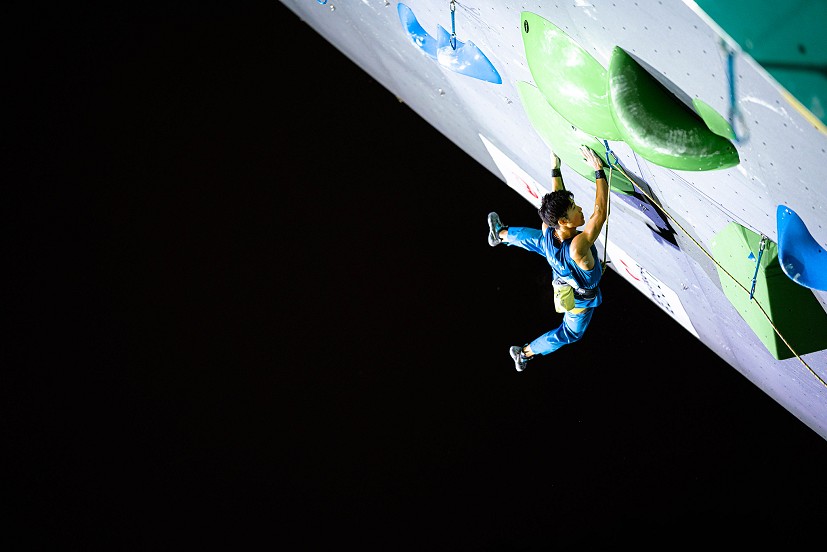
Luka Potocar (SLO) needed a 7th place or higher finish to guarantee the overall title, and he cut things fine, ending up in 7th. It's great to see another Slovenian man follow in he footsteps of past legends such as Domen Skofič and Jernej Kruder in achieving the ultimate IFSC competition climbing accolade. Raviandi Ramadhan (INA) came 8th and was impressive in his first finals, showing himself to be a real contender for the future.
Most athletes fell at the crux around hold 27/28 but Ao Yurikusa (JPN) managed to cling on for one more move than the others, and completed a dominant finals for Team Japan ahead of Masahiro Higuchi (JPN) and Sebastian Halenke (GER). Three of the top four athletes were from Japan, showing the immense depth in their squad. At every World Cup it seems like they have a different team, it's like they are searching for the best possible Olympic combination of climbers.
Ai Mori (JPN) wasn't in Jakarta and there seemed to be various reasons floating around as to why. I'm not going to comment on some of the rumours swirling around her, but I did speak to the Japanese Lead coach to find out the official team reason. It is apparently down to a selection choice decided earlier in the season and they are aiming to save her for the Combined competition in Japan In a few weeks' time.
As we've often seen this year, the gold was a straight fight between Janja Garnbret (SLO) and Chaehyun Seo (KOR). Janja had qualified for the finals in 3rd place after she fell on the final move of the semi-final route. That gave the advantage to Chaehyun Seo (KOR) and Hannah Meul (GER) who had both topped the climb. Hannah was climbing in her first Lead finals, a stat that just didn't seem right; I suppose I'm used to seeing her in boulder finals all year. She was just outside of the podium in 4th, and looked relaxed and confident on the wall.
Janja climbed first of these top three athletes and cruised through the route, reaching the final few moves, which featured nasty thumb sprags, or presses, with most of the tiny holds having no texture. Janja hesitated here for the first time. She switched on what I call 'safe climbing mode', focusing on the small details and careful to make every movement count. She experimented with a few different ways of thumb pressing, before committing to palming against them. It worked and she made the pop for the top and clipped the chains.
So the pressure was on Chaehyun, and she got to the same nasty sequence of holds. She was favouring using her thumb, but as our cameras panned in to show how small they really were, she adjusted, and that caused her to fire off the hold and fall.
In that moment Janja took her 23rd Lead World Cup win and of course the overall title, the 2022 IFSC season drew to a close.
It's been a rollercoaster of a ride, with cancelled and re-scheduled competitions along the way. It's not quite the end to IFSC competition climbing though as the Japan Combined World Cup (Boulder + Lead) takes place towards the end of October. We now get a few weeks of rest…although I'm jumping straight back on a plane and heading to Israel for the 'Golden Holds' competition. Available to watch (for free) on Youtube.
I want to extend a huge congratulations to the Indonesian Climbing Federation for hosting us so successfully. Aesthetically it was one of the best venues I've been to, and the Indonesian people and climbers welcomed us warmly.

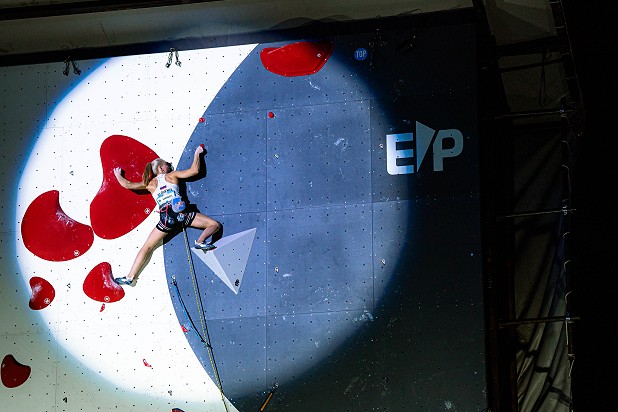
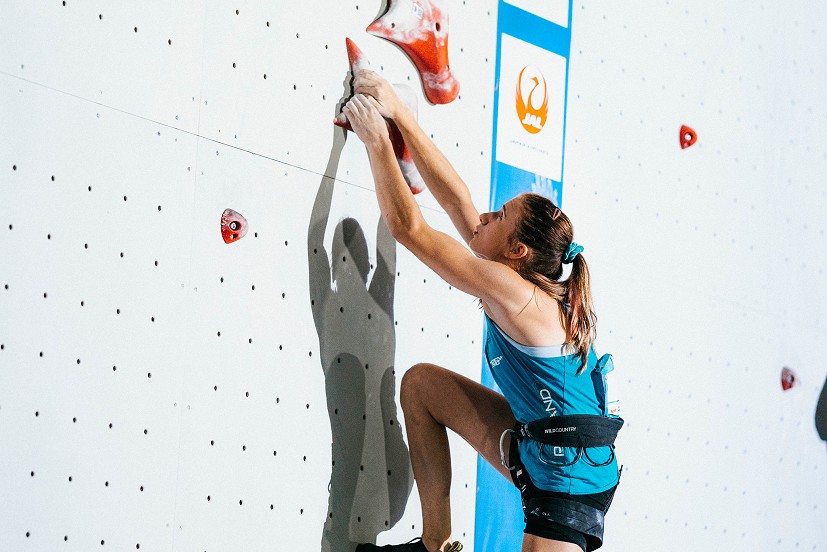
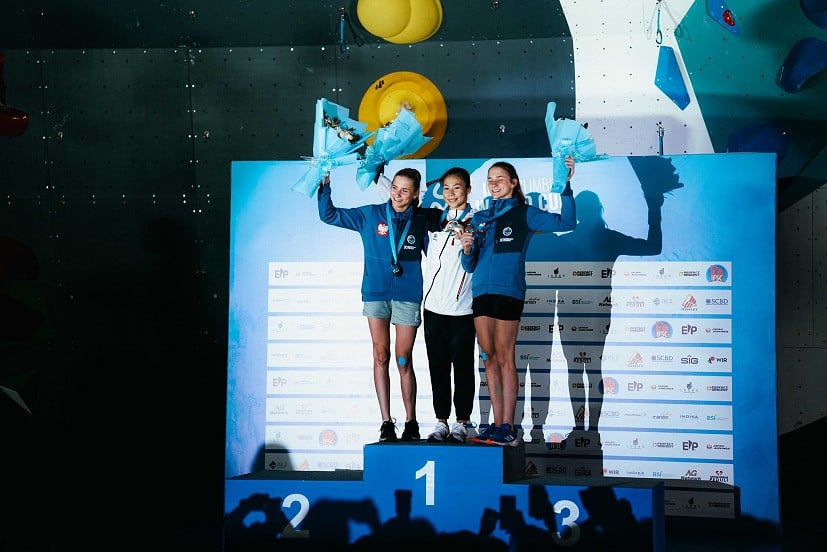
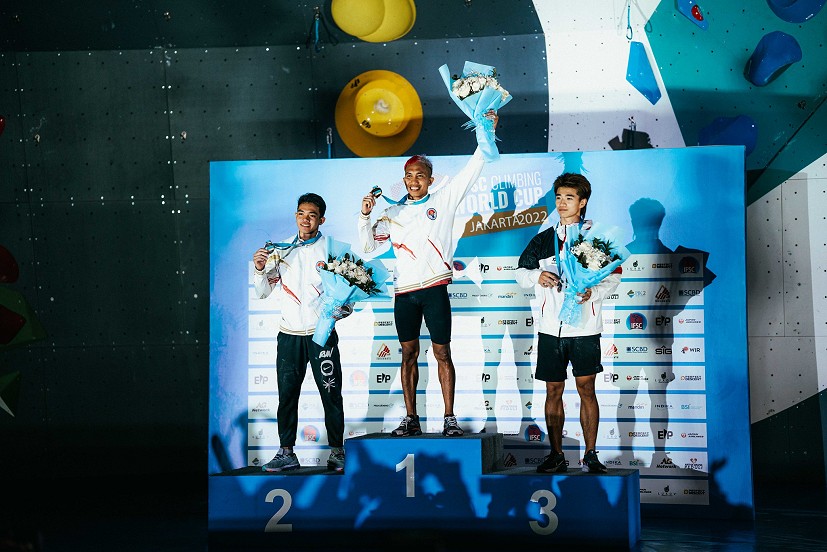
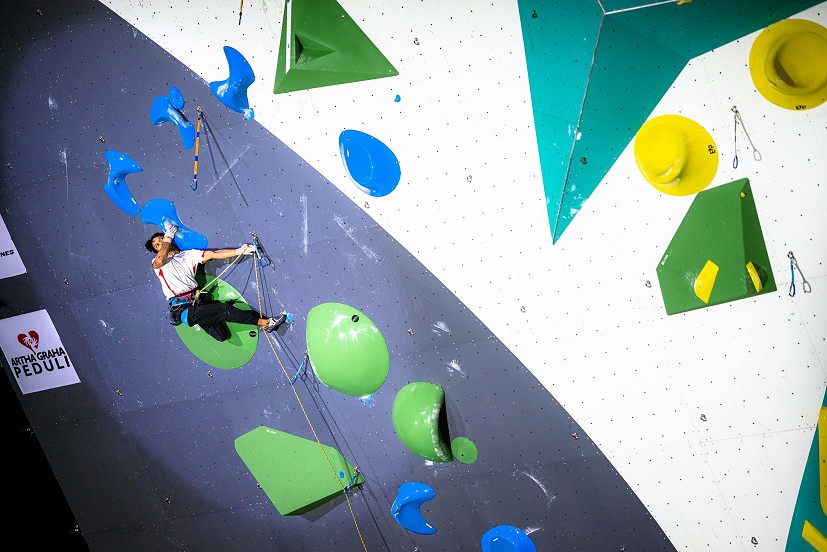
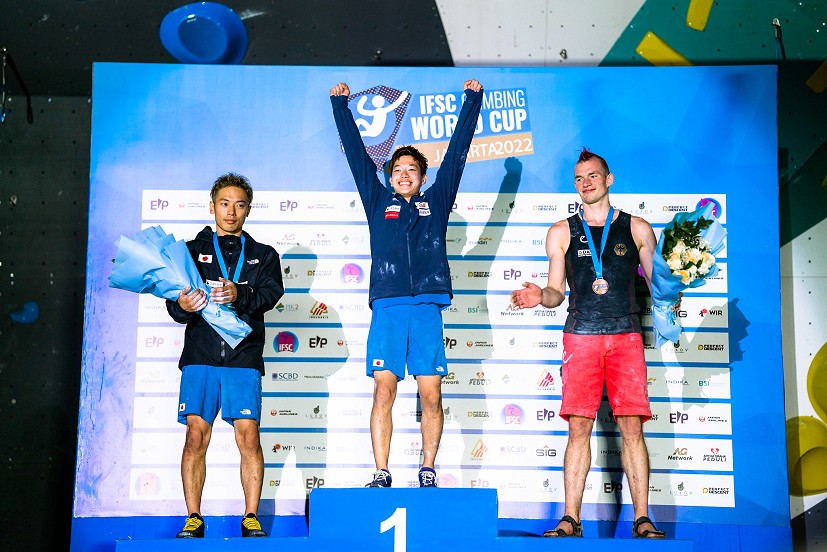
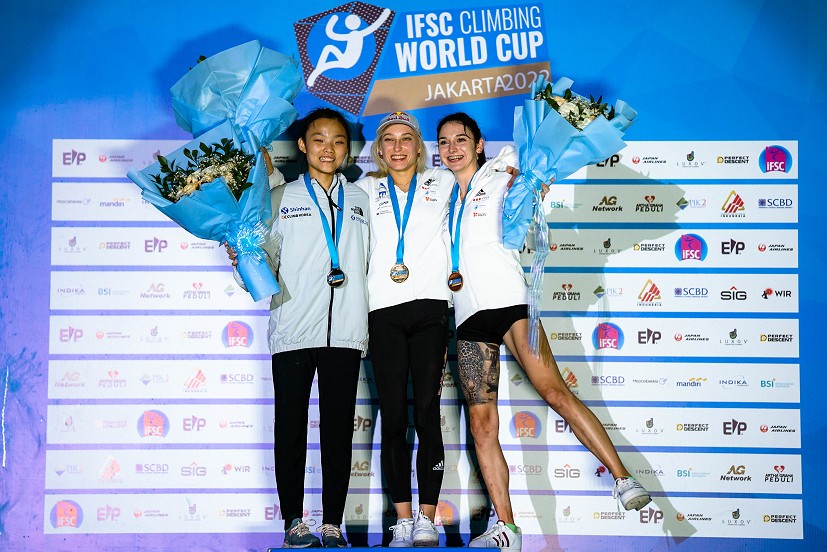


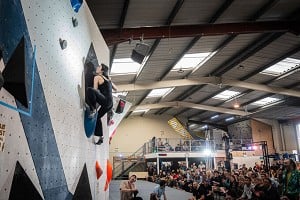
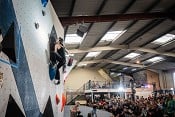




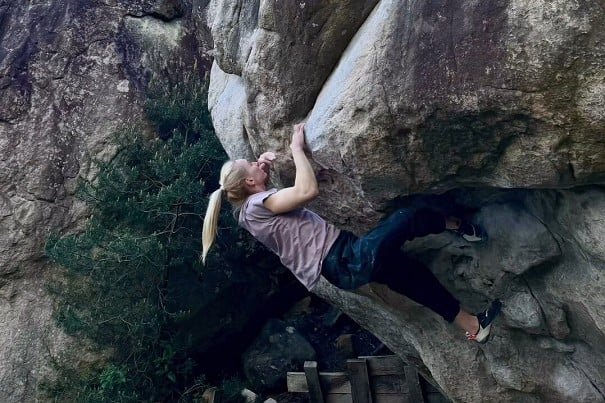

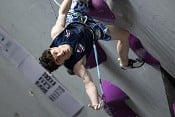
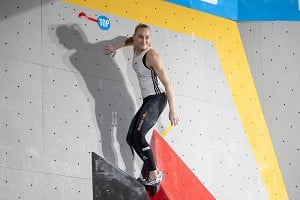
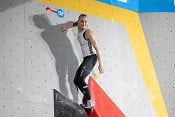
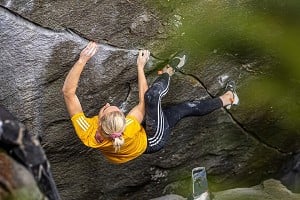
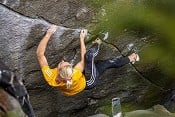
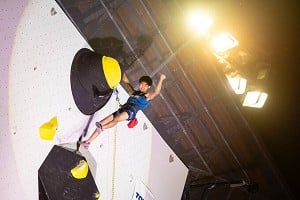
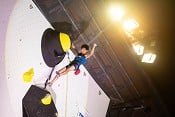
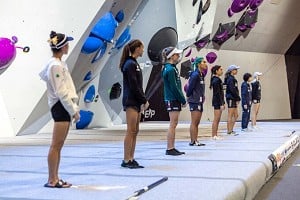
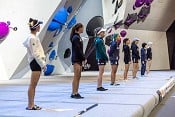
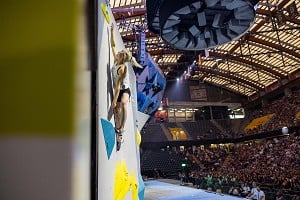
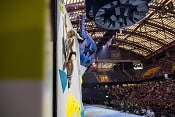

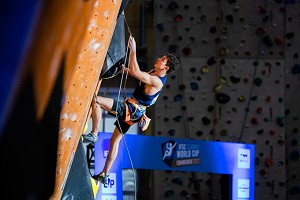
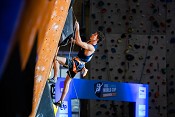
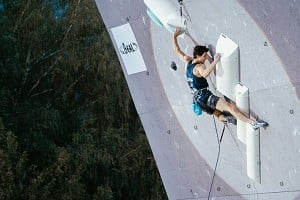
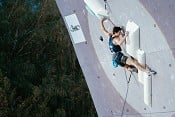
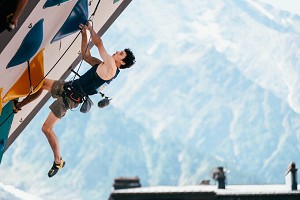
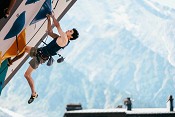
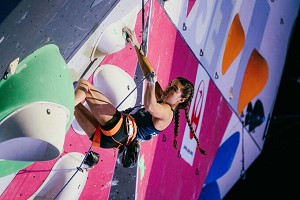
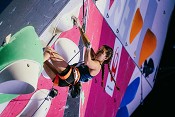
Comments